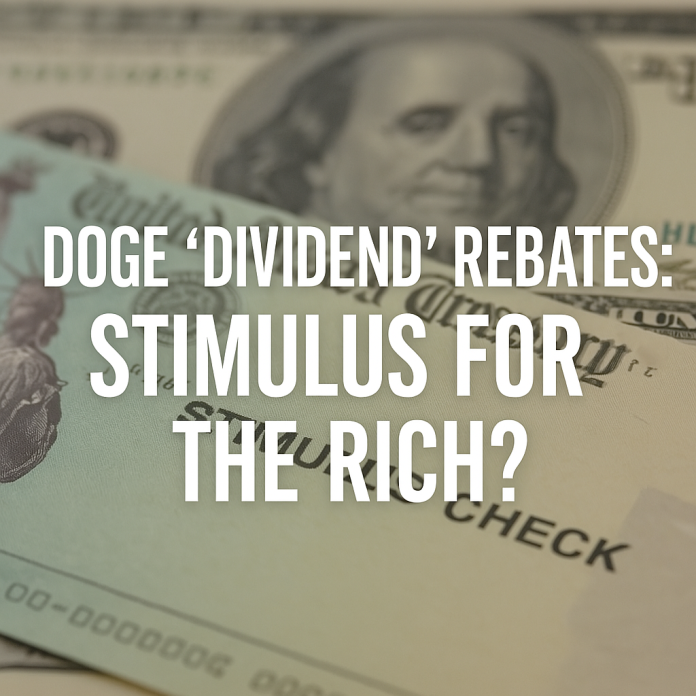— By Newspot Staff Writer
A proposed tax rebate dubbed the “DOGE Dividend”, spearheaded by investment manager James Fishback, is sparking a wave of outrage and confusion across economic and political circles. Unlike previous COVID-era stimulus packages designed to assist broad swaths of Americans, the DOGE rebate seems laser-focused on rewarding wealthier taxpayers, leaving lower- and middle-income earners completely out of the equation.
The proposal, which Fishback claims was “revealed to him in a dream,” suggests that 20% of the savings generated by the Department of Government Efficiency (DOGE) be returned to taxpayers—as long as they have a net-positive tax contribution. That disqualifies nearly half of American households, according to the Tax Foundation, which reports that the bottom 50% of earners contribute only 3% of total individual income taxes.

Fishback’s model ensures that households that receive more in tax credits than they pay in taxes—primarily lower-income groups—get nothing. Critics are branding the plan as an upward wealth transfer disguised as a refund. The Pew Research Center supports this concern, noting that most Americans earning under $40,000 receive more in tax credits than they owe—making them ineligible for the rebate.

With backing from Elon Musk and growing buzz from within the Trump administration, the DOGE dividend has gained attention. Trump has hinted at his support during recent rallies, framing it as a “reward for true contributors.” But financial analysts say the policy dangerously favors the elite.
“While the policy is structured as a tax rebate, it’s effectively a redistribution of wealth—from the government’s budget to high-income households,” said CouponSnake’s finance expert, Aaron Razon.

Economists are wary of the inflationary ripple effect. “Even if upper-income Americans save or invest part of the rebate,” Razon warned, “the remaining spending could spike demand and pressure supply chains, much like during the COVID stimulus era.”
National Business Capital CEO Joseph Camberato added, “We’ve already seen what injecting billions into the economy does. A rebate now, no matter the intent, adds fire to the inflation furnace.”

Despite DOGE volunteers touting massive savings—including $10 billion from Social Security alone—many remain skeptical of those numbers. Reports estimate DOGE has saved more than $130 billion in total. Still, critics say the math is fuzzy and needs verification. (Read more on MarketWatch)

Still, some believe the DOGE rebate is more about optics than economics. Insurance executive Lucas Barcelo says it’s a “political move aimed at building early wins for Trump’s second term.”
Whether the rebate becomes a reality or remains a campaign stunt, financial experts are sounding the alarm: don’t count on it. “Policies like this can mislead citizens into thinking windfalls are coming,” Razon cautioned. “Instead of splurging, Americans should focus on saving, debt reduction, and smart investing.”



Share your story or advertise with us: Whatsapp: +2347068606071 Email: info@newspotng.com

 DOGE ‘Dividend’ Rebates: Stimulus for the Rich? Controversy Heats Up Over...
DOGE ‘Dividend’ Rebates: Stimulus for the Rich? Controversy Heats Up Over...











 NEWSPOT NIGERIA DAILY PULSE
NEWSPOT NIGERIA DAILY PULSE  April 10, 2025
April 10, 2025




